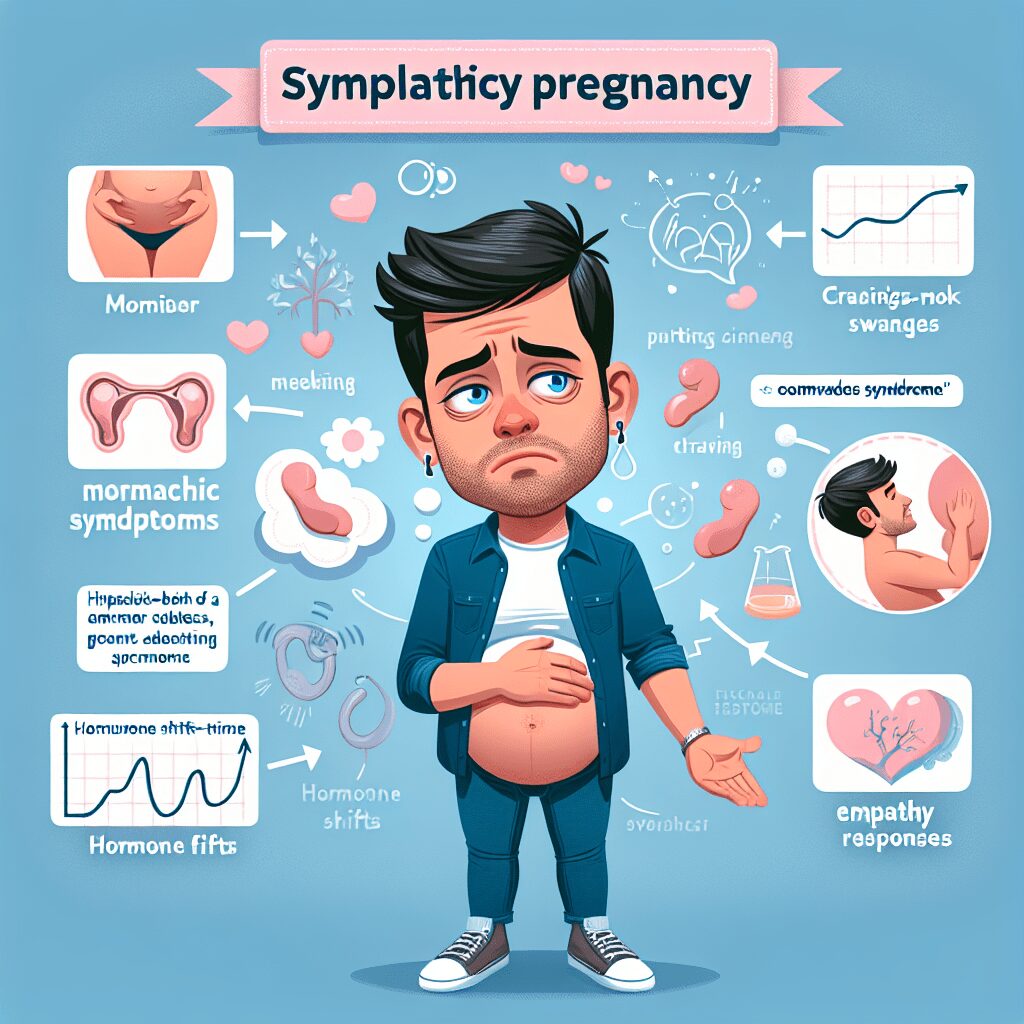Understanding Pregnancy Symptoms in Dads: The Fascinating Science Behind Couvade Syndrome
Pregnancy is often seen as a beautiful journey that primarily revolves around the mother-to-be. However, there’s a fascinating twist to this narrative: the psychological and emotional effects it can have on the father. For many expecting dads, this can mean experiencing pregnancy symptoms themselves—an occurrence known scientifically as Couvade Syndrome. In this blog post, we’ll explore this intriguing phenomenon, discussing the symptoms, psychological aspects, and real-life experiences that come with it.
1. What is Couvade Syndrome?
Couvade Syndrome, or sympathetic pregnancy, refers to the phenomenon where expectant fathers experience physical symptoms parallel to those of their pregnant partners. These symptoms can vary widely, ranging from gastrointestinal issues to emotional changes.
Merging science with anecdote, the name "couvade" is derived from the French word "couver," meaning "to incubate." Historically, this syndrome can be traced back centuries, with various cultures around the world recognizing this shared pregnancy experience. The roots of this phenomenon lie in the bond between the parents and the emotional journey they undertake together, leading to shared experiences and sensations.
2. The Symptoms: What to Look Out For
Understanding the symptoms of Couvade Syndrome is crucial for fathers-to-be. Some common experiences include:
- Nausea and Vomiting: Many dads report varying degrees of nausea while their partners face morning sickness.
- Weight Gain: Surprisingly, a lot of fathers find themselves packing on the pounds, mirroring their pregnant partners’ cravings and dietary changes.
- Fatigue: As if carrying a baby for nine months isn’t exhausting enough, some dads experience a significant decline in energy levels as well.
- Mood Swings: Just like their partners, expectant dads can experience heightened emotional states, which may lead to irritability or sudden bouts of joy.
- Abdominal Pain: Some have reported phantom pains or cramps in the abdomen, mirroring those experienced by their partners.
Recognizing these symptoms is the first step towards understanding the emotional connection between parents during this transformative period.
3. Why Does it Happen? The Psychological Perspective
From a psychological standpoint, Couvade Syndrome can be understood in various ways. For many fathers, the impending arrival of a child comes with a multitude of stressors and emotional upheaval. The bond between partners can heighten empathy, causing the father to internalize the feelings and experiences of the mother-to-be.
Additionally, cultural expectations can play a role. In many societies, men are expected to exhibit strength and stoicism. However, as they navigate their partner’s pregnancy, they may feel vulnerable, leading to physical manifestations of anxiety or emotional turmoil. Essentially, Couvade Syndrome can be considered a fascinating interplay between emotional investment and physical response.
4. The Biological Connection: Hormones at Play
Believe it or not, biology also plays a role in Couvade Syndrome. Studies indicate that hormonal changes—such as fluctuations in cortisol and prolactin—can occur in expectant fathers, leading to physical and emotional changes. This connection is not merely anecdotal; proponents of this idea suggest that hormonal empathy may physically signify a father’s emotional investment in the pregnancy.
The concept of shared biology may even extend to how fathers subconsciously tune into their partners’ experiences. For example, the mere act of spending time together can lead to similar levels of oxytocin, the bonding hormone, resulting in shared feelings of joy, anxiety, or distress.
5. Different Manifestations Across the Globe
Interestingly, the manifestations of Couvade Syndrome can differ significantly across cultures. In some societies, ritualistic practices allow fathers-to-be to openly express their concerns and emotions, leading to a more supportive transition into fatherhood.
For instance, in certain Indigenous cultures, specific rites exist where the father engages in behaviors mirroring those of the mother. Such traditions foster transparency and connection, giving space for fathers to express their experience, both emotional and physical.
Conversely, in societies where emotional expression is chastised or viewed as a sign of weakness, dads might repress their symptoms. This suppression can lead to higher levels of anxiety, depression, and even result in negative outcomes for both parents and the child.
6. Real Experiences: Tales from Expectant Dads
To better understand the phenomenon of Couvade Syndrome, we turn to real-world experiences shared by fathers-to-be. Many recount feelings of anxiety as they navigated through their partner’s pregnancy. In various forums, the stories range from humorous to heart-wrenching, all centered around their emotional journeys.
One father shared, "During my partner’s first trimester, I felt all the nausea but had to keep it a secret. I didn’t want to seem weak or needy." On the flip side, another said, "Whenever my wife felt a kick, I found myself out of breath. It was like I could feel every movement she experienced."
These anecdotes shine a light on the profound connections that can emerge between partners as they embark on this journey together.
7. How to Support Your Partner While Navigating Symptoms
If you find yourself experiencing symptoms of Couvade Syndrome, instead of isolating yourself, it’s essential to keep communication open with your partner. Here are some tips on how to manage this experience together:
- Talk About It: Open discussions about your experiences can foster understanding and connection. Share what you’re feeling—physically and emotionally.
- Involve Yourself in the Process: Engaging in baby preparation, attending prenatal classes, and even creating a nursery encourages bonding for both partners.
- Seek Support: It’s perfectly normal to encounter stress during this period. Don’t hesitate to seek out support networks, whether friends, family, or professional counseling.
8. A Positive Spin: Transforming Couvade into Connection
While Couvade Syndrome can be bewildering and confusing, it’s crucial to view it as a transformative experience rather than a burden. Instead of feeling weighed down by the symptoms, embrace the notion that you are collectively experiencing this significant moment in both your and your partner’s lives.
Channel these feelings into positive actions—create rituals to celebrate your impending arrival, engage in activities that enhance your bond as partners and co-parents, and allow yourselves to grow together. Embracing this phenomenon can lead to deeper intimacy and a profound sense of partnership.
Conclusion
Couvade Syndrome reveals an intricate tapestry of emotional and psychological shifts that accompany pregnancy. While the shared experience may lead to physical symptoms, at its core lies a rich narrative of connection, empathy, and shared anticipation. Understanding the science behind it allows couples to embrace and navigate these overwhelming yet beautiful changes together.
Whether you’re experiencing Couvade Syndrome or supporting your partner through her pregnancy, remember that you are not alone on this journey. Cherish the experience, communicate openly, and, most importantly, prepare together for the wonderful adventure of parenthood that awaits!
FAQs
1. Is Couvade Syndrome a recognized medical condition?
While it’s often recognized in both psychological and medical contexts, Couvade Syndrome is not classified as a formal medical diagnosis. It is a notable phenomenon rather than an established condition.
2. How common is Couvade Syndrome?
Estimates suggest that about 20 to 60% of expectant fathers experience some form of Couvade Syndrome. It’s more prevalent among men who are highly involved in their partners’ pregnancies.
3. Can Couvade Syndrome affect my health?
Generally, it does not lead to serious health issues, as most symptoms are temporary and linked to emotional distress or anxiety. However, if you find the symptoms significantly affecting your quality of life, consulting a medical professional would be wise.
4. How can partners support each other during this time?
Open communication is key. Taking time to listen, share feelings, and partake in the pregnancy experience—such as prenatal check-ups and nesting—can strengthen your relationship.
5. Will these symptoms disappear after the baby is born?
In most cases, symptoms tend to lessen significantly after childbirth. However, emotional experiences may continue to evolve as the couple adjusts to their new roles as parents.
Instantly Access Your Free Children’s Books Here! (https://payhip.com/BlueCherryStore) – Disclaimer: I may earn a commission from qualifying purchases as an affiliate. Please note that I only recommend products I believe will provide value to my readers.(M)









